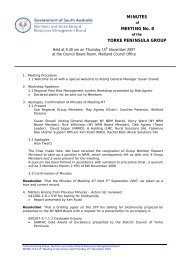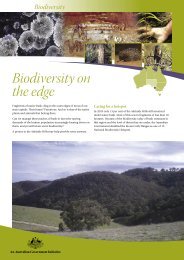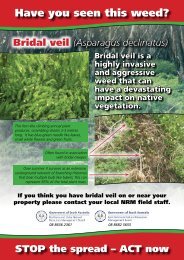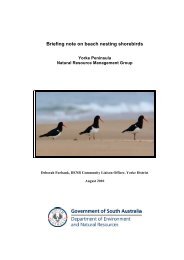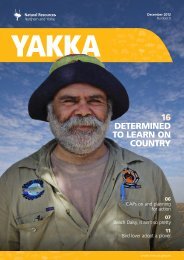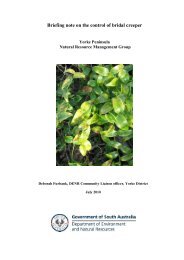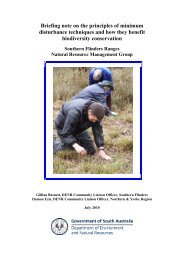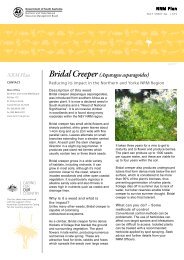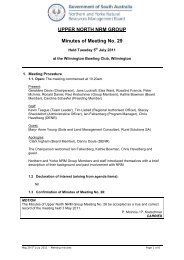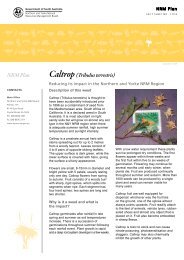Caring for country - Northern and Yorke Natural Resources ...
Caring for country - Northern and Yorke Natural Resources ...
Caring for country - Northern and Yorke Natural Resources ...
Create successful ePaper yourself
Turn your PDF publications into a flip-book with our unique Google optimized e-Paper software.
4feature<br />
Plan bee<br />
Bill Nicholas reports on plans to resist a tiny killer.<br />
Broadacre <strong>and</strong> horticulture crop yields are expected<br />
to take a substantial blow if a global bee disease<br />
that devastates beehive populations makes its way into<br />
Australia.<br />
<strong>Yorke</strong> Peninsula agri consultant, Bill Long, who has just<br />
returned from a Churchill fellowship tour of the US,<br />
Europe <strong>and</strong> the UK says despite our best quarantine<br />
ef<strong>for</strong>ts it was inevitable that varroa mite would<br />
establish itself in Australia.<br />
His tour involved studying the effects of the mite on<br />
bee populations <strong>and</strong> the impact on crops dependent on<br />
the pollinating species. Varroa mites are insects the size<br />
of a pinhead that attack bees making them susceptible<br />
to other diseases. Bee populations globally have been<br />
decimated by the varroa mite.<br />
The US devastation of beehives has led to the situation<br />
where Cali<strong>for</strong>nian almond growers have had to<br />
contract half of the US beekeeping industry to move to<br />
their almond orchards <strong>for</strong> a month during flowering to<br />
make sure the almond crop is fertilised to produce the<br />
high value crop.<br />
In the UK, the devastating bee mite has wiped out<br />
beehives <strong>and</strong> now the <strong>country</strong> has a governmentsupported<br />
<strong>and</strong> retail industry sponsored campaign<br />
to beef up the numbers of feral bumble bees to take<br />
over the fertilising work previously done by beehives of<br />
working bees.<br />
Bill Long said pollination was a factor limiting crop<br />
yields in Australia because there were insufficient<br />
managed, feral <strong>and</strong> native pollinators – <strong>and</strong> the varroa<br />
mite could potentially further reduce these numbers.<br />
He said his experiences had shown him that the<br />
Australian industry must be prepared to minimise the<br />
effects of the mite if it “arrived” in the <strong>country</strong>.<br />
“The challenge <strong>for</strong> Australian beekeepers <strong>and</strong> the<br />
industry is to develop a plan <strong>for</strong> when the varroa<br />
mite enters Australia, <strong>and</strong> be very clear on what that<br />
reaction <strong>and</strong> response will be,” Mr Long said.<br />
“It affects a hive’s strength by sucking blood from<br />
adults <strong>and</strong> the emerging bee brood. The hive is<br />
eventually overrun by the mite, but it’s not the varroa<br />
mite that kills the bees but the viral diseases that<br />
develop because the hive is weakened.”<br />
Mr Long said Australia needed to learn from the<br />
mistakes of the US, <strong>and</strong> be fully prepared <strong>for</strong> the insect.<br />
His Fellowship objective was to investigate profitable<br />
large scale pollination services which have developed<br />
since the varroa mite emerged.<br />
Since his paper ‘Building large scale pollination <strong>and</strong><br />
preparedness to manage disease <strong>and</strong> varroa mite’ was<br />
published, Mr Long has attracted serious attention<br />
from top levels of agribusiness.<br />
He has discussed the development of an Australian<br />
pilot of Operation Pollinator with Syngenta, which<br />
financed Mike Edwards on a UK trip in September to<br />
conduct field studies <strong>and</strong> meet with key ecologists <strong>and</strong><br />
farmer groups.<br />
The <strong>Northern</strong> <strong>and</strong> <strong>Yorke</strong> NRM Board has committed<br />
$35,000 towards this project, <strong>and</strong> a scoping study on<br />
Operation Pollinator is proceeding with Department of<br />
Agriculture, Fisheries <strong>and</strong> Forestry’s representatives at<br />
Kadina <strong>and</strong> Crystal Brook.<br />
Support is being sought from State Minister<br />
<strong>for</strong> Environment <strong>and</strong> Conservation Paul Caica <strong>and</strong><br />
Shadow Minister Adrian Pederick MP, the member <strong>for</strong><br />
Wakefield, Steven Griffith, the <strong>Yorke</strong> Peninsula Alkaline<br />
Soils Group <strong>and</strong> the Rural Industries <strong>and</strong> Development<br />
Corporation to fund a scoping study <strong>for</strong> a proposed<br />
Pollination <strong>and</strong> Honeybee Research CRC.<br />
Mr Long said his local project to counter bee<br />
devastation would be based on the success of<br />
Operation Bumblebee in the UK, where bee<br />
populations were increased by up to 600 per cent <strong>and</strong><br />
other insects were increased tenfold.<br />
Syngenta was sponsoring Operation Pollinator, a five<br />
year program to provide habitat <strong>and</strong> food sources <strong>for</strong><br />
pollinating insects across Europe. The project aimed to<br />
boost numbers of pollinating insects in order to protect<br />
biodiversity <strong>and</strong> improve crop yields <strong>and</strong> crop quality.<br />
The project is currently being run in the UK, France,<br />
Germany, Hungary, Italy, Spain, Portugal <strong>and</strong> the USA.<br />
The project uses scientific research findings to develop<br />
site specific ways of creating habitats alongside the<br />
working farm environment.<br />
“There is an urgent need to prepare <strong>for</strong> the arrival<br />
of varroa mite <strong>and</strong> to identify alternative pollinating<br />
species that exist in our environment,” Mr Long said.<br />
“An examination of habitat that will enhance the<br />
existence of both native <strong>and</strong> feral populations of<br />
pollinating species is required.<br />
“Together, policy makers need to link with the<br />
scientific, agricultural, apicultural <strong>and</strong> ecological<br />
communities to continue to develop <strong>and</strong> enhance<br />
programs that will ensure continued <strong>and</strong> improved<br />
pollination services to agricultural <strong>and</strong> ecosystems<br />
across Australia.”<br />
Top right: <strong>Yorke</strong> Peninsula agri consultant Bill Long.<br />
Right: Operation Bumble Bee was launched on a property in Ox<strong>for</strong>dshire<br />
in United Kingdom (pictured). It is working towards a better distribution of<br />
flowering clovers to halt the decline of bumble bees.<br />
Photo: Michael Richards<br />
Left: Bee populations globally have been decimated by the varroa mite.<br />
Photo: Rowan Edwards<br />
<strong>Northern</strong> <strong>and</strong> <strong>Yorke</strong> <strong>Natural</strong> <strong>Resources</strong> Management Board 17




